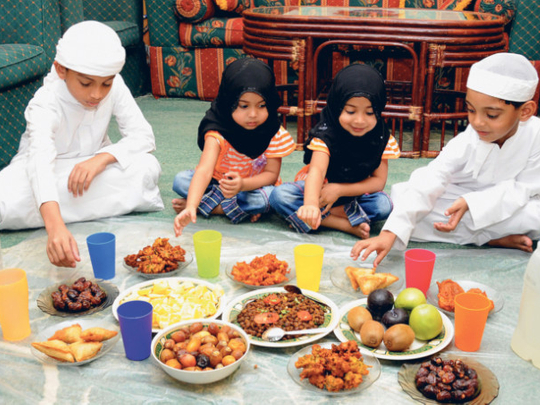
Many children fast during Ramadan. Even though they are not required to fast before the onset of puberty, many parents encourage children to fast at a younger age to get them accustomed to the ritual of fasting.
Since they are new to this and need getting used to the sense of discipline that fasting requires, it is essential to teach them the right way to do it, especially since Ramadan takes place during the hot summer months this year.
Fasting is not always easy on the little ones given that they are more active, require more energy and fluids. Who should fast and how long a child should fast is a question for parents to consider. Parents should assess the child’s ability to fast based on their health, activity level, tolerance to hunger and eating frequency.
If children are fasting, let them be a part of this decision. Start getting them accustomed to eating less frequently during the day and minimise the number of meals gradually before the month begins.
Children under ten should start fasting until noon and then increase the fasting time further into the month. Parents are advised to monitor the fasting child’s intake closely to make sure they are meeting their calorie and fluid requirements.
Children should be encouraged to avoid high-intensity exercise and drink lots of fluid during non-fasting hours to remain hydrated. The suhour meal is an essential part of fasting for children. They should have fibre-rich foods such as whole wheat cereals, wholegrains, legumes, fruit and vegetables and good sources of protein such as lean meats, nut butter, eggs and dairy products to stay full for longer. Try to have them avoid high-sugar foods, since it will increase their cravings and provide no nutrients for the calories. Salty foods should also be limited to avoid thirst.
One mistake a lot of parents make is forcing children to overeat at suhour or iftar. Overeating will only cause indigestion, bloating and discomfort. In some cases, it is better for children to split iftar into two meals to prevent overloading of food.
Carbonated drinks, and spicy and fried foods should also be avoided. It is essential for children to meet their calorie requirements during the non-fasting hours to stay nourished.
The most important thing is eating a variety of foods from all food groups, such as wholegrains (wholegrain cereals, brown pasta, wholegrain breads and quinoa), fruits and vegetables, dairy products (milk, yoghurt and cheese), meat and meat alternatives (beef, chicken, turkey, eggs, nuts and legumes) and healthy fats (olive/canola oil, avocado, fatty fish and flax seeds), keeping well hydrated and being lightly active during the fasting hours.











